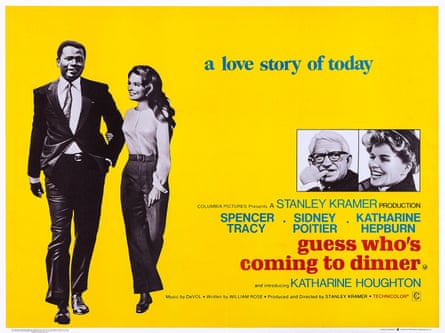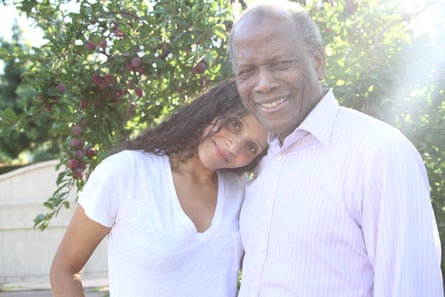Sidney Poitier remembered by Sydney Tamiia Poitier | Sidney Poitier
When I first think of my father, I don’t think of an actor or a cultural figure. I think of this playful, goofy man who would sing me and my sister To Bed, To Bed, To Bed, said Sleepyhead, a bedtime song he learned in the Bahamas. Then there was this aeroplane game, where he’d pick us up one at a time, fly us around the house, and at the end, pretend to dunk our heads in the toilet. We’d laugh and scream and he’d hug us tight. That was the heart of who my dad was.
Only in my teens did I start to take in the magnitude of who he was and what he did; as a kid, when he was on screen, I just thought it was funny. As I got older, I started to get a very deep appreciation for the career choices that he made, such as being in a scene where he’s kissing a white woman in the back of a cab in Guess Who’s Coming to Dinner. That film resonated with me particularly because my mom [Canadian actor Joanna Shimkus] is white, and her name is also Joanna [like Poitier’s girlfriend, played by Katharine Houghton]. As a child, it felt like watching my parents’ love story, but as I matured I realised how brave it was to tell that story in the mid-1960s when interracial marriage was still illegal in many states.
My dad never talked very openly about how challenging it was to be the only black man to have won an Academy Award during such a tumultuous time for civil rights, but there definitely was a sense of him carrying a very heavy responsibility. He took his role within the civil rights movement very seriously: he understood that a lot of white Americans were shaping their ideas of who black people were from film and TV because they were not exposed to black people in their day-to-day life on any deep or significant level. He understood the power of that medium in cultivating people’s perceptions, and he realised that the burden fell upon him o help cultivate a more honest and nuanced understanding of black culture.
He didn’t talk much about acting at home, but I will say one thing I learned from him about acting is the way that you should conduct yourself on set – show up on time, work hard, and value the crew that you’re working with, because they’re working twice as hard as you are for twice as long. Give your all because it’s not just about you, you’re part of a family when you are on set. His work ethic and his equanimity are traits he learned growing up on Cat Island [in the Bahamas]. I also believe it was his upbringing there that allowed him to carry the burden of his fame, because he grew up on a tiny island surrounded by people who truly valued him for who he was. It gave him a sense of self-worth that he wouldn’t have had if he’d grown up under the racist oppression of the US. So when he came to this country at 13, and was asked to go to the back door instead of the front, he said no, I don’t think so. It made no logical sense to him because he hadn’t been raised under the burden of that system.

His refusal to bend to that is responsible for much of what he contributed to society. Also, his undying curiosity about the world and humanity, and his desire to leave the world a better place than he found it are largely responsible for the gifts he gave us. He always read multiple newspapers and books, especially about the universe and the cosmos — to him, education was everything, especially for children because he recognised the power in knowledge. Later in life, he’d travel the world speaking about his experiences to various groups and he loved doing that. He also wrote several books. Acting didn’t intrigue him anymore. He had played all the parts that he wanted. Being alone with his mind, his thoughts and a pen and paper was his happy place. He spent a lot of time in his office or his bed writing. I think he secretly wanted to be a writer rather than an actor. It was a way that he could explore the endless complexities of the human experience in his own time and his own way.
Even when he lost his ability to write, and then eventually wasn’t able to read [he had Alzheimer’s in later life], his insatiable curiosity remained. You’d go into a room and he might not even know who you were, but he would look at you, he’d take you in, studying you, watching your expressions. When my seven-year-old daughter would leap on to the bed, he would laugh and look at her, and while he couldn’t speak, I know exactly what he was saying in his mind. “Who is this delightful creature!?” He would study her with joy and fascination. I’m sad that she won’t know him as I did, but I find great relief in the fact that his movies and his books have left behind a treasure map of sorts for her. A lifetime of wisdom and gifts, all there for her to mine, and I look forward to watching her discover just how incredible her grandfather was.
When I first think of my father, I don’t think of an actor or a cultural figure. I think of this playful, goofy man who would sing me and my sister To Bed, To Bed, To Bed, said Sleepyhead, a bedtime song he learned in the Bahamas. Then there was this aeroplane game, where he’d pick us up one at a time, fly us around the house, and at the end, pretend to dunk our heads in the toilet. We’d laugh and scream and he’d hug us tight. That was the heart of who my dad was.
Only in my teens did I start to take in the magnitude of who he was and what he did; as a kid, when he was on screen, I just thought it was funny. As I got older, I started to get a very deep appreciation for the career choices that he made, such as being in a scene where he’s kissing a white woman in the back of a cab in Guess Who’s Coming to Dinner. That film resonated with me particularly because my mom [Canadian actor Joanna Shimkus] is white, and her name is also Joanna [like Poitier’s girlfriend, played by Katharine Houghton]. As a child, it felt like watching my parents’ love story, but as I matured I realised how brave it was to tell that story in the mid-1960s when interracial marriage was still illegal in many states.

My dad never talked very openly about how challenging it was to be the only black man to have won an Academy Award during such a tumultuous time for civil rights, but there definitely was a sense of him carrying a very heavy responsibility. He took his role within the civil rights movement very seriously: he understood that a lot of white Americans were shaping their ideas of who black people were from film and TV because they were not exposed to black people in their day-to-day life on any deep or significant level. He understood the power of that medium in cultivating people’s perceptions, and he realised that the burden fell upon him o help cultivate a more honest and nuanced understanding of black culture.
He didn’t talk much about acting at home, but I will say one thing I learned from him about acting is the way that you should conduct yourself on set – show up on time, work hard, and value the crew that you’re working with, because they’re working twice as hard as you are for twice as long. Give your all because it’s not just about you, you’re part of a family when you are on set. His work ethic and his equanimity are traits he learned growing up on Cat Island [in the Bahamas]. I also believe it was his upbringing there that allowed him to carry the burden of his fame, because he grew up on a tiny island surrounded by people who truly valued him for who he was. It gave him a sense of self-worth that he wouldn’t have had if he’d grown up under the racist oppression of the US. So when he came to this country at 13, and was asked to go to the back door instead of the front, he said no, I don’t think so. It made no logical sense to him because he hadn’t been raised under the burden of that system.

His refusal to bend to that is responsible for much of what he contributed to society. Also, his undying curiosity about the world and humanity, and his desire to leave the world a better place than he found it are largely responsible for the gifts he gave us. He always read multiple newspapers and books, especially about the universe and the cosmos — to him, education was everything, especially for children because he recognised the power in knowledge. Later in life, he’d travel the world speaking about his experiences to various groups and he loved doing that. He also wrote several books. Acting didn’t intrigue him anymore. He had played all the parts that he wanted. Being alone with his mind, his thoughts and a pen and paper was his happy place. He spent a lot of time in his office or his bed writing. I think he secretly wanted to be a writer rather than an actor. It was a way that he could explore the endless complexities of the human experience in his own time and his own way.
Even when he lost his ability to write, and then eventually wasn’t able to read [he had Alzheimer’s in later life], his insatiable curiosity remained. You’d go into a room and he might not even know who you were, but he would look at you, he’d take you in, studying you, watching your expressions. When my seven-year-old daughter would leap on to the bed, he would laugh and look at her, and while he couldn’t speak, I know exactly what he was saying in his mind. “Who is this delightful creature!?” He would study her with joy and fascination. I’m sad that she won’t know him as I did, but I find great relief in the fact that his movies and his books have left behind a treasure map of sorts for her. A lifetime of wisdom and gifts, all there for her to mine, and I look forward to watching her discover just how incredible her grandfather was.
